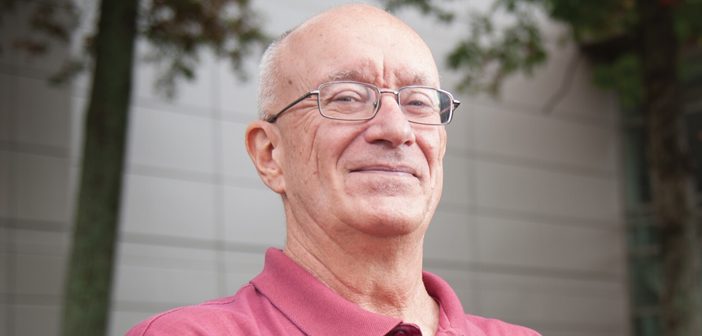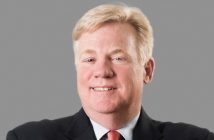By: Troy Watkins
Rick Hayden ’87 arrived for an appointment with the Association for the Support of Human Services in the late 1970s. Five steps stood between him and his destination. He hopped down from his wheelchair, maneuvered his body up the steps while pulling his chair, and made it to his meeting. “Back then, you just had to assess the best way to overcome an obstacle,” Hayden says.
When the Americans with Disabilities Act was passed in 1990 to prohibit discrimination against individuals with disabilities in all areas of public life, things got much easier for Hayden and the 40 million Americans living with a disability. Hayden sustained a spinal cord injury in 1976 while riding a motorcycle at the age of 21, but he didn’t let it stop his will to succeed.
Today, he is the national chapter liaison of the United Spinal Association, dedicated to improving the quality of life for Americans with spinal cord injuries and disorders (SCI/D). He well understands the need for support. Larry Lajoie, a peer counselor at Stavros Independent Living Center in Amherst, played a major role in Hayden’s recovery and education in how to cope with a spinal cord injury.
Lajoie fueled a fire inside Hayden to assist others with SCI/D. He worked in various fields and capacities before devoting his time to assisting those with spinal cord injuries.
Hayden earned degrees from Springfield Technical Community College and Springfield College before completing a bachelor’s degree in marketing at Westfield State. After a stint in the insurance industry, Hayden was recruited by Everest & Jennings to become its marketing manager. Based in California, it was the first company to mass-produce wheelchairs. That began 30 years in the forprofit sector for Hayden, including work in sales, consulting, the dealer network, and his management of Colours, the fourth largest company in wheelchair sales.
Hayden moved into the nonprofit sector with United Spinal in February 2018, when he was named national chapter liaison and a member of its board of directors. He has led the organization’s Southern California Chapter as president, and, in 2018, he participated in his sixth Roll on Capitol Hill, United Spinal’s annual legislative advocacy event that addresses issues impacting the health, independence, and quality of life for those with SCI/D.
“To be a part of such a significant movement that makes a difference in the lives of so many is so fulfilling,” says Hayden. “I’ve been fortunate to pave my own way through life, but there are many who can’t, and I carry those folks with me into each meeting, pushing for bills to be passed that will provide a better quality of life for all of us, as well as a greater sense of independence.”
This year, United Spinal’s Southern California Chapter clarified its vision to focus on employment. According to Hayden, the unemployment rate for those who are disabled and seeking employment is 9.4 percent, compared to a 4.2 percent rate for able-bodied individuals.
With that disparity, we are trying to impact that figure and work with human resources departments to educate them about accommodations required for employers,” he said. “For people to achieve independence, employment is a top priority.”



